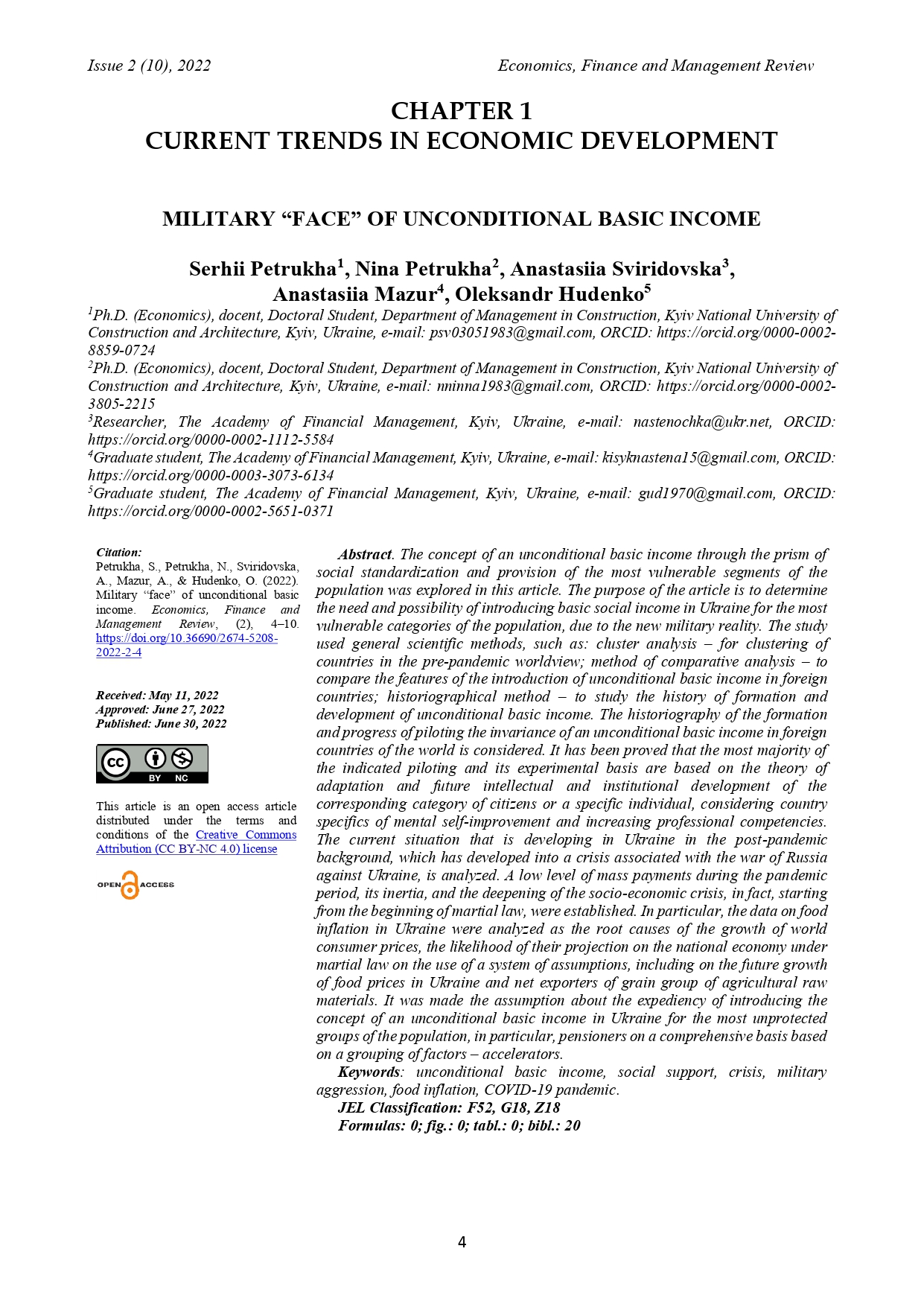MILITARY “FACE” OF UNCONDITIONAL BASIC INCOME
DOI:
https://doi.org/10.36690/2674-5208-2022-2-4Keywords:
unconditional basic income, social support, crisis, military aggression, food inflation, COVID-19 pandemicAbstract
The concept of an unconditional basic income through the prism of social standardization and provision of the most vulnerable segments of the population was explored in this article. The purpose of the article is to determine the need and possibility of introducing basic social income in Ukraine for the most vulnerable categories of the population, due to the new military reality. The study used general scientific methods, such as: cluster analysis – for clustering of countries in the pre-pandemic worldview; method of comparative analysis – to compare the features of the introduction of unconditional basic income in foreign countries; historiographical method – to study the history of formation and development of unconditional basic income. The historiography of the formation and progress of piloting the invariance of an unconditional basic income in foreign countries of the world is considered. It has been proved that the most majority of the indicated piloting and its experimental basis are based on the theory of adaptation and future intellectual and institutional development of the corresponding category of citizens or a specific individual, considering country specifics of mental self-improvement and increasing professional competencies. The current situation that is developing in Ukraine in the post-pandemic background, which has developed into a crisis associated with the war of Russia against Ukraine, is analyzed. A low level of mass payments during the pandemic period, its inertia, and the deepening of the socio-economic crisis, in fact, starting from the beginning of martial law, were established. In particular, the data on food inflation in Ukraine were analyzed as the root causes of the growth of world consumer prices, the likelihood of their projection on the national economy under martial law on the use of a system of assumptions, including on the future growth of food prices in Ukraine and net exporters of grain group of agricultural raw materials. It was made the assumption about the expediency of introducing the concept of an unconditional basic income in Ukraine for the most unprotected groups of the population, in particular, pensioners on a comprehensive basis based on a grouping of factors – accelerators.
Downloads
References
Petrukha N.M., Petrukha S.V. (2020). State regulation of integrated corporate associations in the conditions of structural-institutional and functional transformation of rural economy: problems of methodology, theory, socio-economic and sectoral policy: monograph. Kyiv: Professional Publishing House LLC, 496 p.
Petrukha S., Petrukha N., Sviridovska A. Standardization of Implementation of the Mandatory Privately Managed Pillar of the Pension System of Ukraine. Economics, Finance and Management Review. 2021. Issue 4(8 Р. 42–57. Retrieved from: https://doi.org/10.36690/2674-5208-2021-4-42.
Петруха С. В. (2022). Мілітаризація світової економіки та нова аграрна стратегія. Retrieved from: https://conf.krok.edu.ua/MMO/MMO-2022/paper/view/1162.
International Monetary Fund. (2022). World economic outlook “War sets back the global recovery”. Retrieved from: https://www.imf.org/en/Publications/WEO/Issues/2022/04/19/world-economic-outlook-april-2022.
Food and Agriculture Organization of the United Nations. (2022). FAO Food Price Index rises to record high in February. Retrieved from: https://www.fao.org/newsroom/detail/fao-food-price-index-rises-to-record-high-in-february/en.
Food and Agriculture Organization of the United Nations. (2022). The FAO Food Price Index makes a giant leap to another all-time high in March. Retrieved from: https://www.fao.org/worldfoodsituation/foodpricesindex/en/.
Dziamulych M., Petrukha S., Yakubiv V., Zhuk O., Maiboroda O., Tesliuk S., Kolosok A. Analysis of the Socio-Demographic State of Rural Areas in the System of their Sustainable Development: a Case Study of Ukraine. Management, Economic Engineering in Agriculture and Rural Development. 2021. vol. 21, Issue 4. Р. 223–234. Retrieved from: http://managementjournal.usamv.ro/pdf/vol.21_4/Art26.pdf.
Thomas Paine. (1999). Agrarian justice. Digital edition. Retrieved from: http://piketty.pse.ens.fr/files/Paine1795.pdf.
Marangos, John. (2004). Social Dividend versus Basic Income Guarantee in Market Socialism. Taylor & Francis, Ltd. р. 20–40.
Arneson, Richard. (1992). Is Socialism Dead? A Comment on Market Socialism and Basic Income Capitalism . The University of Chicago Press. р. 485–511.
Kotlyrevskiy Y., Petrukha S., Mandzinovska Kh., Brynzei B., Rozumovych N. (2022). Impact of Modern Information and Communication Technologies on Economic Security in the Context of COVID-19. International Journal of Computer Science and Network Security. VOL. 22 No.1. Р. 199–205. Retrieved from: https://doi.org/10.22937/IJCSNS.2022.22.1.27
Andriyiv N., Voloshchuk K., Petrukha S., Orlovska O., Kurylо O. (2022). Impact of COVID-19 on the Labor Market in the Context of Ensuring Economic Security. International Journal of Safety and Security Engineering. Vol. 12, No. 1. Р. 71–76. Retrieved from: https://doi.org/10.18280/ijsse.120109.
Hugh Frazer and Eric Marlier. (2016). Minimum Income Schemes in Europe. Retrieved from: https://ec.europa.eu/social/BlobServlet?docId=15304&langId=en.
Charlie Young. (2018). Realising basic income experiments in the UK. Retrieved from: https://www.thersa.org/globalassets/pdfs/reports/realising-basic-income.pdf.
Martinelli, L., & Pearce, N. (2019). Basic Income in the UK: Assessing Prospects for Reform in an Age of Austerity. Social Policy and Society, 18(2), P. 265-275. Retrieved from: doi:10.1017/S147474641800026X.
Petrukha S., Shubaliy A. (2021). Assessment of a Stimulating Effect of Wages on Economic Growth of Border Regions of Poland and Ukraine. Konteksty Społeczne. Vol 9, № 2 (18). Р. 22–34. Retrieved from: http://doi.org/10.17951/ks.2021.9.2.22-34.
Citizens of which countries receive part of the sale of national wealth. (2021). Retrieved from: https://www.slovoidilo.ua/2021/07/15/infografika/svit/hromadyany-yakyx-krayin-otrymuyut-chastynu-prodazhu-naczionalnyx-bahatstv.
Basic Income Scotland. (2017). Retrieved from: basicincome.scot.
Switzerland: Voters Reject Unconditional Basic Income. (2016) Retrieved from the Library of Congress Retrieved from: https://www.loc.gov/item/global-legal-monitor/2016-06-06/switzerland-voters-reject-unconditional-basic-income/.
OECD. (2017). Basic income as a policy option: Technical Background Note Illustrating costs and distributional implications for selected countries. Retrieved from: https://www.oecd.org/els/soc/Basic-Income-Policy-Option-2017-Brackground-Technical-Note.pdf.

Downloads
Published
How to Cite
Issue
Section
License

This work is licensed under a Creative Commons Attribution-NonCommercial 4.0 International License.








